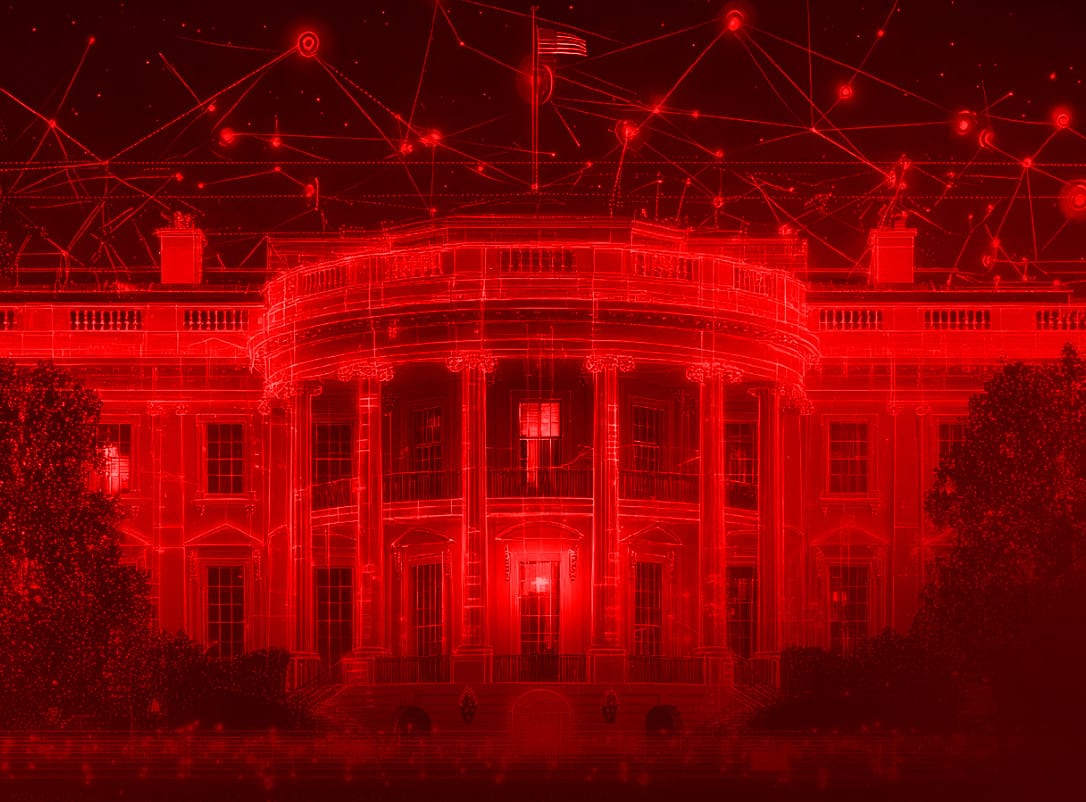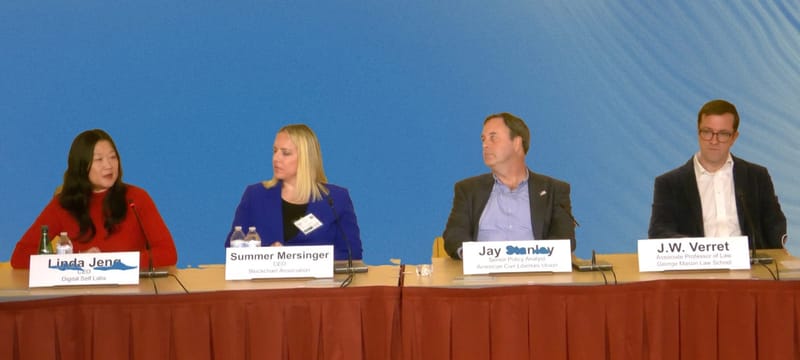US Government To Bring PATRIOT Act to Digital Assets
FinCEN Director reveals that the Treasury is finalizing a ban on privacy tools, Representatives revive Special Measures to Fight Modern Threats Act
This article was updated on Sept. 12th 2025 at 3pm ET to reflect that the Special Measures to Fight Modern Threats Act no longer contains an exemption from public notice requirements. It was additionally updated to reflect public comments on the Treasury's mixer rule issued by industry groups and expand on comments made by FinCEN Director Andrea Gacki to include the quote that the rule must be tailored toward illicit activity.
This week seems to be the week of revisiting useless legislation that turned fatal for the constitutional rights of US Americans while proving lethal for many non-US citizens. While we were happy to report that the Treasury is working on reforming the Bank Secrecy Act yesterday, signed into law by President Richard Nixon in 1970, this 9/11 anniversary we have to report that the Treasury is working on applying the PATRIOT Act to digital assets.
Signed into law after September 11th 2001 by President George W. Bush – the guy who sometimes forgets the difference between Iraq and Ukraine, accidentally told US Americans that his Government was always looking for new ways to harm the country, and illegally invaded not one but two foreign nations (oops) – the PATRIOT Act effectively grants the US Government special powers to bypass constitutional protections in the face of terrorism, including warrantless surveillance and the suspension of due process rights, that have led to the unjust imprisonment and relentless torture of hundreds of people around the world.
Since 2001, the PATRIOT Act has significantly shaped the financial world, mandating the strict application of know-your-customer frameworks, tightening anti-money laundering laws, and increasing the sharing of sensitive information between both private and public entities.
Now, FinCEN Director Andrea Gacki confirmed that the Treasury is working on finalizing the so-called mixer rule, which uses the PATRIOT Act to prohibit private transactions in cryptocurrency. At the same time, Representative Nunn of Iowa let slip that the House appears to continue to work on the Special Measures to Fight Modern Threats Act, a PATRIOT Act digital asset legislation that's long been thought dead, which would solidify the Treasury's use of Section 311 to prohibit specific transactions.

FinCEN Is Finalizing PATRIOT Act "Mixer Rule"
In July, the White House asked the Treasury to finalize the so-called mixer rule, a Biden era regulation that would outlaw almost every mechanism for privacy on public blockchains for US Americans. In this week's FinCEN oversight hearing, Director Gacki confirmed that the Treasury is currently working on finalizing the rule.
“We are seeing more and more illegal transactions being done in crypto,” Representative Liccardo claimed in the hearing, citing a study which found that out of 111 examined fraud cases, 91% allegedly involved so-called decentralized finance, or 'DeFi'. The concern here, according to Liccardo, arises from the pseudonymity of transactions. "How exactly are you going to do your job when transactions move through DeFi?" Liccardo asked the Director.
While Gacki stated that FinCEN was working with blockchain analysis companies to deanonymize pseudonymous transactions, Liccardo countered that software like mixers would allow users to evade even sophisticated detection techniques.
To alleviate Liccardo's concerns, Gacki pointed Liccardo to the Biden-era mixer rule, stating that FinCEN and the Treasury are "exploring next steps on that." Since the mixer rule has already passed the notice of proposed rule making and public comment periods, its next step would be the finalization of the rule. The delicate thing is to not restrict legitimate transactions, such as by people trying to shield their activity from oppressive regimes, Gacki stated, adding that "we have to make sure that we tailor any approach here to be really directed at illicit activity".

The "Mixer Rule" is not a Mixer Rule
The Treasury's mixer rule is not so much a mixer rule rather than a blanket ban on any software and even behavior that would grant users of public blockchains transactional privacy.
As such, the rule would deem the following software and behaviors a primary money laundering concern, meaning that such transactions would end up blocked by centralized intermediaries, and could put an end to the development of privacy software even for non-custodial wallets under the threat of criminal liabilities. These include:
- pooling or aggregating [cryptocurrency] from multiple persons, wallets, addresses, or accounts
- using programmatic or algorithmic code to coordinate, manage, or manipulate the structure of a transaction
- splitting [cryptocurrency] for transmittal and transmitting the [cryptocurrency] through a series of independent transactions
- creating and using single-use wallets, addresses, or accounts, and sending [cryptocurrency] through such wallets, addresses, or accounts through a series of independent transactions
- exchanging between types of [cryptocurrency] or other digital assets
- facilitating user-initiated delays in transactional activity
Notably, the mixer rule's suggestions on cryptocurrency swaps, transaction delays, "splitting," and the creation of single-use addresses, wallets, and accounts, would even put users under suspicion with the authorities, potentially ending in criminal liability – similar to how transaction structuring, sometimes also known as "smurfing," is deemed a federal crime in traditional finance, referring to the intentional breakup of transactions to fall below the $10,000 currency transaction reporting requirement. In traditional finance, smurfing carries a federal prison sentence of up to 5 years, even if the money transferred did not stem from illicit origins.
As a consortium of industry groups, including the Bitcoin exchange Swan, the Venture Capital fund TenX, and the bitcoin privacy wallet Samourai Wallet wrote during the rule making's public comment period last year, "the proposed special measures would unreasonably infringe upon the legitimate financial privacy interests of cryptocurrency users, and would apply to a variety of digital techniques that are not mixing transactions at all, but rather simply represent good cybersecurity practices."
Similarly, the advocacy group CoinCenter stated at the time that if the Treasury's proposed standard was applied to non-digital currency transactions, "any transaction involving physical cash would be a [primary money laundering concern]. This category is wooly, subjective, and immense. It effectively includes any transaction made with privacy."
Reviving the Special Measures to Fight Modern Threats Act
While this week's FinCEN oversight hearing was meant to evaluate the efficiency of the agency's actions to fight financial crime, such as the Bank Secrecy Act and the Corporate Transparency Act, many Representatives posed questions on the threats of cryptocurrencies.
As Representative Castens of Illinios told Director Gacki, elderly fraud is a particular concern to his constituents, citing a Chicago Sun article titled "Chicago's crypto ATMs are magnets for drug dealing and scams on older adults." While Castens' truly heartbreaking stories of elderly constituents losing money to bitcoin ATMs surely were moving, the Representative seemed much less concerned for crypto crime when he himself sat on the receiving end of convicted felon Sam-Bankman Fried's FTX.
"We’ve allowed all these transactions to operate overseas, the mixers are overseas, the transactions are overseas, it’s great that we have the [Suspicious Transaction Reports], but they don't have a way of getting in. Is there specific statutory authority that you currently lack that would allow you to go after the bad guys?" Castens asked Gacki. In 2024, Castens had already proposed a two-year mixer ban in the US under the Blockchain Integrity Act.
Gacki told Castens that FinCEN has been using authorities under the PATRIOT Act's Section 311 to go after specific groups in the digital assets sector. Gacki told the Representative that she was very proud of Section 311 and the powerful authority it grants the Government. Prohibiting specific transactions would be a way to modernize his authority, Gacki stated, to which Castens responded that "Mr. Himes has been active on the 311 authority – let's talk offline and see how we might tweak that and improve it."

Banning All Cryptocurrency Transactions for non-US Jurisdictions
The Special Measures to Fight Modern Threats Act, originally introduced in 2022 by Representative Himes of Connecticut as part of the COMPETES Act, would effectively grant the Treasury the power to ban any type of transaction it deems a concern without public notice or input under PATRIOT Act authority. While the exemption from public notice requirements was ultimately excluded from the Act, the Bill still sought to expand the Treasury's powers to ban types of transactions.
As The Rage contributor Nicholas Anthony wrote for Cato Institute at the time, "one likely scenario is that the Treasury would use this authority to prohibit U.S. banks from being involved with cryptocurrency transactions validated by miners located outside of the United States."
"For example, if the Secretary of the Treasury deems that either (a) the Netherlands, (b) a Dutch crypto exchange, (c) all cryptocurrency transactions validated by a miner outside of the US, or (d) all non-custodial wallets are “of primary money laundering concern,” then she can swiftly make it illegal for any US financial institution (regulated cryptocurrency exchanges included) from maintaining accounts for customers involving those 'concerns,'" CoinCenter's Jerry Brito and Peter van Valkenburgh wrote, calling it "a dangerously authoritarian approach to solving money laundering concerns."
As Brito and Valkenburgh noted, "[a]ll cryptocurrencies are inherently global in scope and therefore any cryptocurrency transaction could credibly be related to a foreign jurisdiction (the block that it appears in may be mined anywhere in the world, copies of the transaction messages are broadcast all over the world, etc.). In short, the language facially empowers the Secretary to prohibit any (or indeed all) cryptocurrency transactions at financial intermediaries."
Independent journalism does not finance itself. If you enjoyed this article, please consider making a donation. If you would like to note a correction to this article, please email corrections@therage.co










